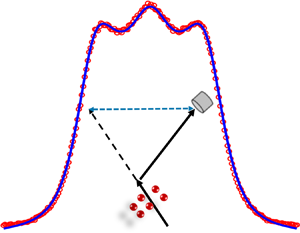Published online by Cambridge University Press: 27 August 2020

Although the thermal conductivity of molecular gases can be measured straightforwardly and accurately, it is difficult to experimentally determine its separate contributions from the translational and internal motions of gas molecules. Yet, this information is critical in rarefied gas dynamics as the rarefaction effects corresponding to these motions are different. In this paper, we propose a novel methodology to extract the translational thermal conductivity (or equivalently, the translational Eucken factor) of molecular gases from the Rayleigh–Brillouin scattering (RBS) experimental data. From the numerical simulation of the Wu et al. (J. Fluid Mech., vol. 763, 2015, pp. 24–50) model we find that, in the kinetic regime, in addition to bulk viscosity, the RBS spectrum is sensitive to the translational Eucken factor, even when the total thermal conductivity is fixed. Thus it is not only possible to extract the bulk viscosity, but also the translational Eucken factor of molecular gases from RBS light scattering spectra measurements. Such experiments bear the additional advantage that gas–surface interactions do not affect the measurements. By using the Wu et al. model, bulk viscosities (due to the rotational relaxation of gas molecules only) and translational Eucken factors of  $\textrm {N}_2$,
$\textrm {N}_2$,  $\textrm {CO}_2$ and
$\textrm {CO}_2$ and  $\textrm {SF}_6$ are simultaneously extracted from RBS experiments.
$\textrm {SF}_6$ are simultaneously extracted from RBS experiments.